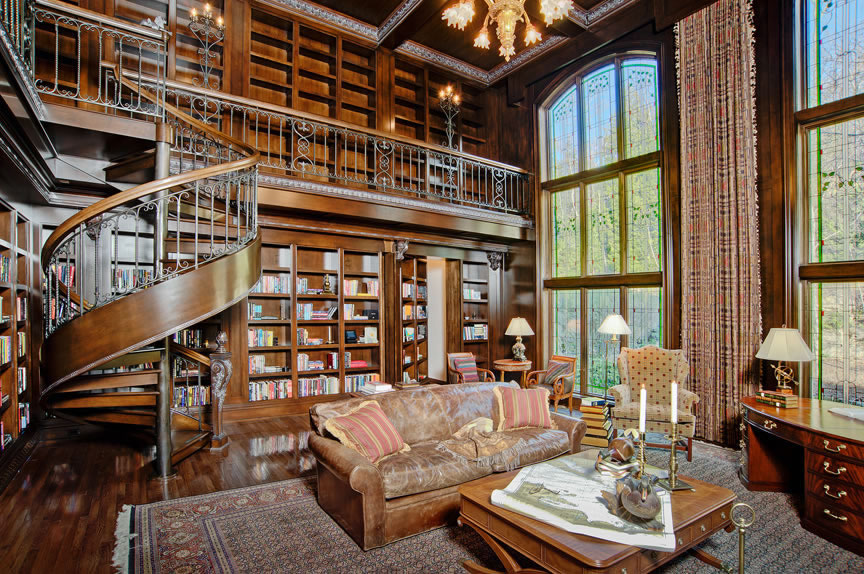The Home Library
During this spring’s recent shelter in place orders, many people spent time cultivating new habits, developing new skills, taking up old hobbies, or taking on home improvement projects. Long-neglected guitars have been dusted off, wood working tools have been sharpened, and gardens have been planted. We’ve been doing all the things we never had time for before the global pandemic forced that time upon us. It’s been nice to reconnect with things we’d put on the back burner.

Alas, the guitar I bought last year is still standing in the corner and there are many home projects my wife would love for me to do, but for me, this time of forced deceleration has meant more time to read. I haven’t kept track, but I’ve probably read ten books over the last few months. What a luxury leisure time is!
My only regret is that my library isn’t more robust. My library (a term I use very loosely indeed) consists of a rather handsome, antique lawyer’s bookcase. It’s stuffed to the gills and boasts an ever-growing tower of overflow volumes stacked on top. It isn’t much, but it’s a fairly well curated and ever-evolving reflection of who I am and who I want to become. Standing in front of it the other day, I began thinking about how home libraries are a snapshot of the owner’s mind.
For example, if you were to look at my humble collection you would see that I am interested in historical fiction, classical literature, military history (especially World War II), Stoic philosophy, spy novels, and William Faulkner. From the worn copy of The Iliad and the copy of Lonesome Dove with the pages falling out, you’d think perhaps I’m the type of person who is satisfied with the status quo. You’d surmise from the series of Foxfire books and my 1917 Webster’s Complete Dictionary (I enjoy “missing words” like “deoxyribonucleic acid” or “West Germany”) that I like “the old ways.” From the entire shelf of Faulkner, you’ll come to one of two conclusions: either this guy wants everyone to think he’s well-read, or he’s a glutton for punishment. The answer is neither. I have a disordered love of Faulkner.
While my bookcase doesn’t hold nearly as many volumes as I’d like to own, my overall collection of books is significantly larger, thanks to my digital library. Back in the mid-2000’s when the first digital book readers started to come out, I refused to entertain the idea of owning one. I declared that this abomination would never last, that this short-lived technological experiment would die as quickly as it came into being. How wrong I was! And how happy I am to have finally embraced this technology. Between my Kindle, Audible, and local library apps, I have literally thousands of digital and audiobooks in my pocket. While they don’t have the comforting feel or the inimitable smell of a real book, these digital volumes mean I always have something fascinating to read.

For decades, I have dreamt of having my own real library: a cozy, book-lined room of dark wood and brass with thick Turkish rugs, a huge fireplace, and big, comfy chairs. There’s a drinks cart in the corner, of course, a painting of an 18th century sea battle above the fireplace, and maybe a gun rack with a pair of Purdey or Holland & Holland shotguns resting quietly until next fall. I fantasize about the books that will fill this beautiful room and the sliding ladder I will need to reach the upper shelves. Perhaps my dream library is a bit clichéd, but clichés become clichés by being universally accepted truths. Your ideal library probably looks different from mine, but it suits you perfectly because it is a projection of your mind, interests, and desires.
I have a friend whose father has a fantastic library. It is my favorite room in an unbelievably beautiful home. It probably helps that he and I share many of the same interests, but over the years whenever I have visited, I have always gravitated to that fabulous room. My friend’s father and I have had many wonderful, far reaching conversations there. Perhaps that’s the best thing about a library or even a bookshelf. They are collections of books, yes, but more than that, they are collections of ideas. Books are the vehicles for ideas, ideas that bridge generations by tapping into universal human emotion and experience, ideas to be explored, digested, and discussed.
I, for one, can never get enough.


 Sign in
Sign in

